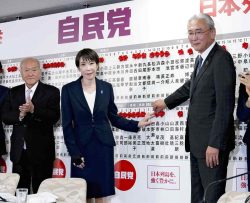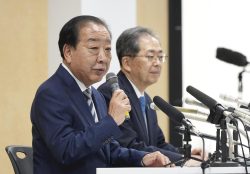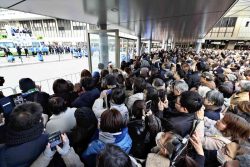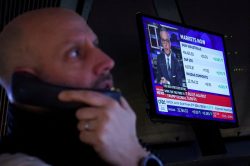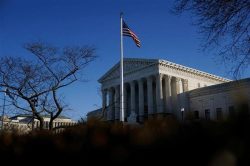Legal Loophole Allows Posters Unrelated to Tokyo Election; NHK Party Trades Spots on Signboards for Donations

Posters containing a QR code are seen on an election signboard in Ota Ward, Tokyo, on Tuesday.
16:54 JST, July 3, 2024
Many posters with content unrelated to candidates in the upcoming Tokyo gubernatorial election have been posted on official election signboards, exploiting a loophole in the relevant law.
Such posters were put up because the NHK Party political group is in effect selling the right to display posters to third parties. The Public Offices Election Law, which emphasizes the “freedom of elections,” contains no provisions restricting the content of posters.
According to a legal expert, however, this was not the intention behind the law.
¥5,000 donation
Posters with a pictures of a girl and flowers drawn by a child have appeared on an election signboard in Ota Ward, Tokyo. When the QR code on the posters is scanned, it leads to a Line social media page belonging to a 69-year-old part-time worker in Yokohama.
The man said he applied for the spots on the signboard in April after seeing NHK Party leader Takashi Tachibana asking people through YouTube to donate money in exchange for the right to put up posters. The man donated ¥5,000 for 24 spots.
The man posts videos on YouTube and said he thought that many people would watch his videos if he put up the posters. However, the number of subscribers to the man’s videos has not increased, he said.
“I understand that there is criticism of putting up unrelated posters. But it’s not illegal and I’m just using what is available,” said the man, who is not eligible to vote in the gubernatorial election.
1,000 locations
NHK Party supports 24 candidates in the Tokyo gubernatorial election. It allowed anyone who donated between ¥5,000 and ¥25,000 to use the spots for the 24 candidates on signboards at about 1,000 locations out of a total of 14,000 in Tokyo.
According to the Tokyo election administration commission, on the day that official campaigning started for the election, the various candidates’ staff lined up in the morning and drew lots to determine in what order the position of the posters would be chosen.
However, people associated with the NHK Party did not participate in the lottery. It later applied repeatedly for signboard space, thereby securing positions on the outer edges.
It appears that the NHK Party has systematically taken over part of the signboards and is making a business out of it.
“We put up what the candidates have allowed, and there’s no legal problem,” Tachibana said.
However, this does not mean there are no restrictions even when a crime is involved.
In the upcoming Tokyo gubernatorial election, the Metropolitan Police Department issued a warning to candidates who had put up a poster showing a woman in a state of near-nudity and those who put up ads for places of adult entertainment in spots for NHK Party-backed candidates.
The MPD warned them to remove such posters on suspicion of violating Tokyo’s anti-nuisance ordinance and the law regulating adult entertainment businesses.
Most of the posters unrelated to election candidates are believed to be for advertising on social media.
“It’s difficult to crack down on them as criminal cases, because the contents don’t clearly violate criminal laws,” a senior police official said.
“The signboard is being used for business. It shouldn’t be like that,” a 40-year-old self-employed man from Fuchu, Tokyo, said after seeing a board in the Kabukicho district of Tokyo’s Shinjuku Ward. The board had a poster of a man who looked like a club host.
Discussion on law revision
A poster for the 1975 mayoral election in Kazo, Saitama Prefecture, was the subject of a legal dispute over a request by the city’s election commission that a candidate remove some of the text printed on the poster.
The 1976 Supreme Court decision ruled that “it is not permissible for an election commission to require the removal or alteration of a poster’s political views or statements on a poster, as this would interfere with the freedom and fairness of the election.
Election posters are not screened in advance.
“The posters are different from the election bulletins printed by the election commission. We will only learn about the posters when we actually see them on bulletin boards,” a Tokyo election administration commission official said.
“Signboards set up with public funds are for presenting candidate’s photos and assertions to voters. It’s inappropriate to use them for any other purpose,” said lawyer Jun Katagi, who was an election division head at the former Home Affairs Ministry, now the Internal Affairs and Communications Ministry.
“The Public Offices Election Law does not envision allowing a third party to use them, as the NHK Party has done this time.”
Chief Cabinet Secretary Yoshimasa Hayashi stressed at a press conference on June 25 that the signboards are not for use by anyone other than election candidates.
The ruling and opposition parties have been calling for measures against the use of signboards that violate the provisions of the Public Offices Election Law. Discussions, including revisions to the law, are likely to get underway in earnest in the future.
Top Articles in Politics
-

Japan PM Takaichi’s Cabinet Resigns en Masse
-

Sanae Takaichi Elected Prime Minister of Japan; Keeps All Cabinet Appointees from Previous Term
-

Japan’s Govt to Submit Road Map for Growth Strategy in March, PM Takaichi to Announce in Upcoming Policy Speech
-

LDP Wins Historic Landslide Victory
-

LDP Wins Landslide Victory, Secures Single-party Majority; Ruling Coalition with JIP Poised to Secure Over 300 seats (UPDATE 1)
JN ACCESS RANKING
-

Japan PM Takaichi’s Cabinet Resigns en Masse
-

Japan Institute to Use Domestic Commercial Optical Lattice Clock to Set Japan Standard Time
-

Israeli Ambassador to Japan Speaks about Japan’s Role in the Reconstruction of Gaza
-

Man Infected with Measles Reportedly Dined at Restaurant in Tokyo Station
-

Videos Plagiarized, Reposted with False Subtitles Claiming ‘Ryukyu Belongs to China’; Anti-China False Information Also Posted in Japan


